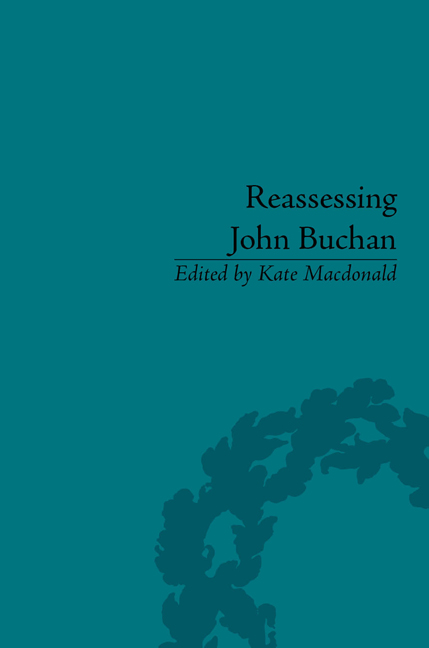Book contents
- Frontmatter
- CONTENTS
- List of contributors
- Introduction
- I Cultural Roots
- 1 John Buchan and Calvinism
- 2 Buchan and the Classics
- 3 ‘Twin Loyalties’: John Buchan's England
- 4 Buchan, Sport and Masculinity
- 5 John Buchan and the Creation of the Springbok Warrior
- II Divided Loyalties
- III Literary Art
- Notes
- Works Cited
- Index
4 - Buchan, Sport and Masculinity
from I - Cultural Roots
- Frontmatter
- CONTENTS
- List of contributors
- Introduction
- I Cultural Roots
- 1 John Buchan and Calvinism
- 2 Buchan and the Classics
- 3 ‘Twin Loyalties’: John Buchan's England
- 4 Buchan, Sport and Masculinity
- 5 John Buchan and the Creation of the Springbok Warrior
- II Divided Loyalties
- III Literary Art
- Notes
- Works Cited
- Index
Summary
In late Victorian and Edwardian society the concept of masculinity was entwined in a series of confusing yet mutually dependent relationships between athleticism, Empire, war and degeneration. John Buchan's life and writings intersected profoundly with this debate. This chapter seeks to elaborate Buchan's beliefs about masculinity by reference to his public life, his biographical and autobiographical writing and in particular the use of sport and the motif of the sportsman in his popular novels. It will suggest that Buchan's adventure stories and his heroes were created in a deliberate attempt to articulate his beliefs to a wider audience. By developing Lowerson's analysis of Buchan's work as presenting a philosophy of life and behaviour to a middle-class readership, light may be shed not only on Buchan's own personal and literary development but also on the broader social and cultural processes which shaped and reflected masculinity in late Victorian and Edwardian Britain. Positioning Buchan and his readership in this way may also contribute to the debate about the reception of modernism in post-war British cultural life.
Athleticism was intimately concerned with codifying the standards of male conduct and behaviour which defined masculinity. Heavily promoted in British public schools, athleticism was predicated on the belief that physical activity, especially team games, inculcated in their pupils the qualities of honesty, fairness, loyalty, cooperation and physical and moral courage. Games were considered to be a valuable social tool which both mirrored and created the norms defining civilized conduct. Success in games, as in life, demanded cooperation, the sublimation of individual desires and the ability to give and take orders. But since success was not simply coterminous with winning, pupils were expected to learn to ‘play the game’ by accepting victory with grace and facing loss with equanimity. These attributes and attitudes were held to be the essence of ‘manliness’.
From at least the last quarter of the nineteenth century an increasingly close connection developed between the public schools and the Empire, as sport and manliness came to be equated with Empire building.
- Type
- Chapter
- Information
- Reassessing John BuchanBeyond the Thirty Nine Steps, pp. 41 - 52Publisher: Pickering & ChattoFirst published in: 2014



